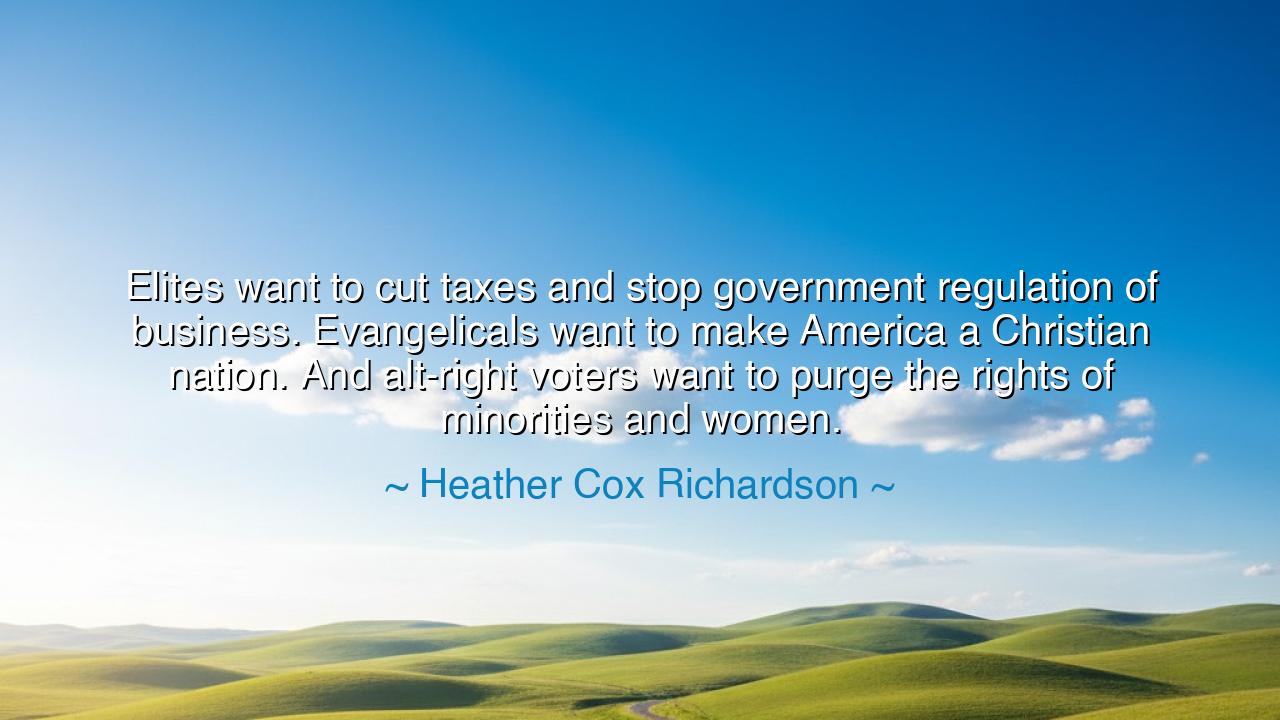
Elites want to cut taxes and stop government regulation of
Elites want to cut taxes and stop government regulation of business. Evangelicals want to make America a Christian nation. And alt-right voters want to purge the rights of minorities and women.






In the chronicles of our divided age, the historian Heather Cox Richardson, wise in the ways of power and the patterns of nations, spoke words that tremble with both warning and truth:
"Elites want to cut taxes and stop government regulation of business. Evangelicals want to make America a Christian nation. And alt-right voters want to purge the rights of minorities and women."
These are not words of rage, but of revelation — the cool fire of understanding that cuts through illusion. They are the mirror held to a civilization that has forgotten its balance, a people who have lost the thread of unity in their pursuit of separate gods. In her voice, one hears not the thunder of condemnation, but the sorrow of remembrance — a call for wisdom, that we might see what has happened to the soul of democracy.
For Richardson speaks not merely of factions, but of the fracturing of purpose. The elites, those who hold the wealth of nations, seek to unbind themselves from the hand of law, yearning for freedom without accountability. Their desire is cloaked in the noble word liberty, yet too often it is liberty for the powerful to rule, not for the powerless to live. The evangelicals, with zeal burning like a temple flame, wish to shape the nation into an image of divine certainty — forgetting that faith loses its purity when wielded as an instrument of state. And the alt-right, driven by fear and anger, would narrow the circle of humanity itself, stripping away the dignity of those who differ in color, in creed, or in gender.
Thus, three streams flow — wealth, faith, and power — each noble in its origin, yet perilous when unrestrained. Together they form a flood that threatens the foundations of freedom, for when self-interest, religious absolutism, and hatred unite, the republic trembles.
History, like an ancient prophet, has told this tale before. In the last days of the Roman Republic, the patricians — the elites of their age — sought to keep their riches untouched by the burden of the poor. The priests, guardians of divine authority, cloaked politics in sanctity. And the mobs, stirred by demagogues, demanded the exclusion of foreigners and slaves from the rights of citizens. Thus fell the republic, not by invasion, but by the slow corrosion of compassion and the worship of division. When one part of the nation sought dominion over all others, Rome’s glory turned to empire, and her liberty to dust.
Richardson’s words are the same lament, reborn for a new empire — one that calls itself a democracy but risks forgetting what that means. The warning is clear: when freedom becomes privilege, and faith becomes law, and fear becomes policy, the pillars of justice crack beneath the weight.
Yet her message is not despair, but remembrance. For beneath the surface of division lies the same eternal possibility — that the people, the citizens of conscience, might awaken. She speaks to the ancient truth that a nation is not merely its rulers, its priests, or its mobs — it is the character of its people. If they choose understanding over hatred, service over greed, and mercy over dogma, then the cycle may yet be broken.
In every generation, the republic is born again — not through declarations or armies, but through the quiet courage of those who hold the center when the edges rage. The wise must speak though mocked, the compassionate must act though weary, and the just must build though others tear down.
Remember, O listener of time, that democracy is not a gift but a discipline. It demands vigilance as the body demands breath. Richardson’s words remind us that every age must decide whether it will live for the whole or for the few. A nation divided between power, piety, and prejudice cannot stand; it must rediscover the sacred ground of equality, where none is master and none is outcast.
So let this be your teaching: guard the balance of your society as you would guard your own soul. Do not let wealth blind you to duty, nor faith turn you against your brother, nor anger devour your compassion. When power tempts you to dominate, remember — the true strength of a nation lies not in conquest, but in conscience.
Thus ends the teaching: unity without justice is tyranny, and liberty without love is ruin. Build, therefore, not a nation of the chosen, but a nation of the just.






AAdministratorAdministrator
Welcome, honored guests. Please leave a comment, we will respond soon